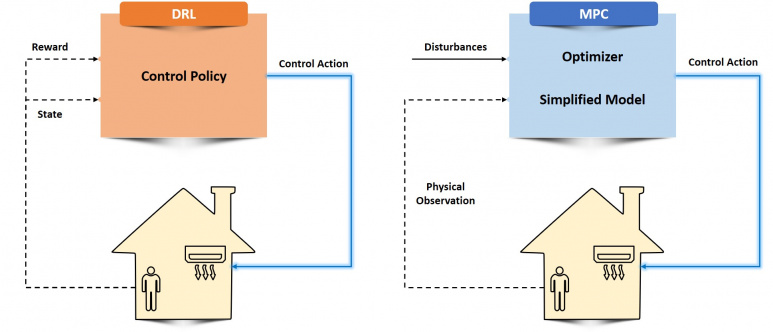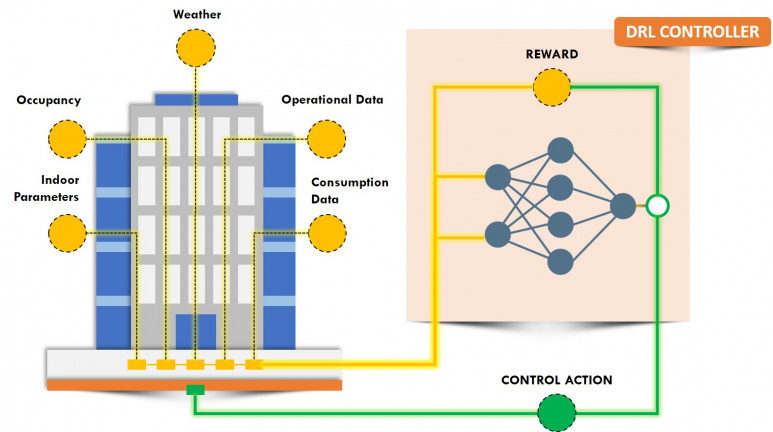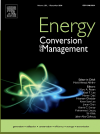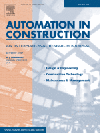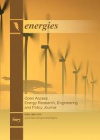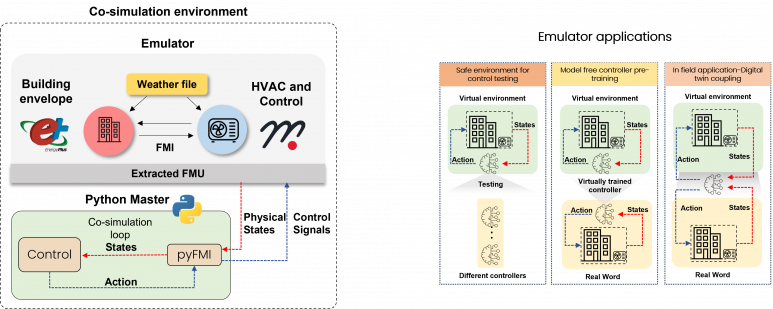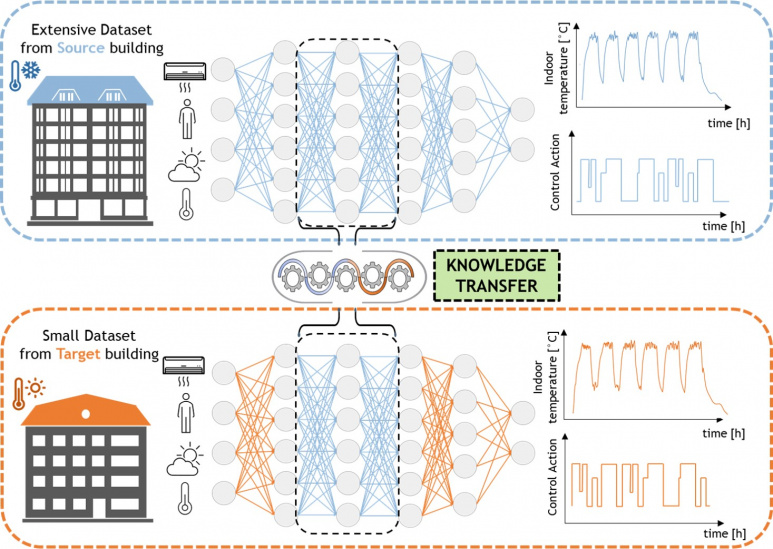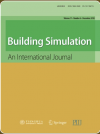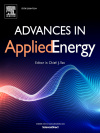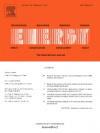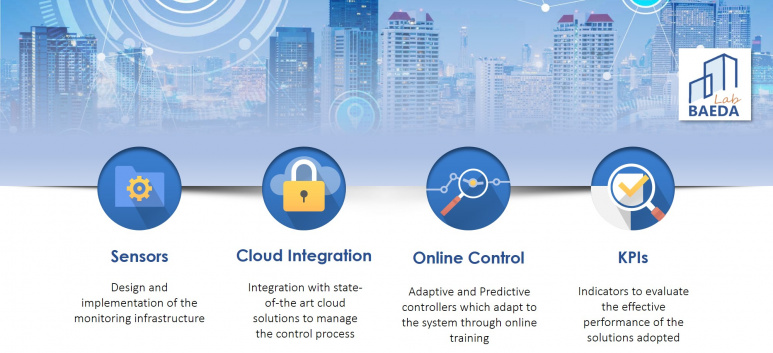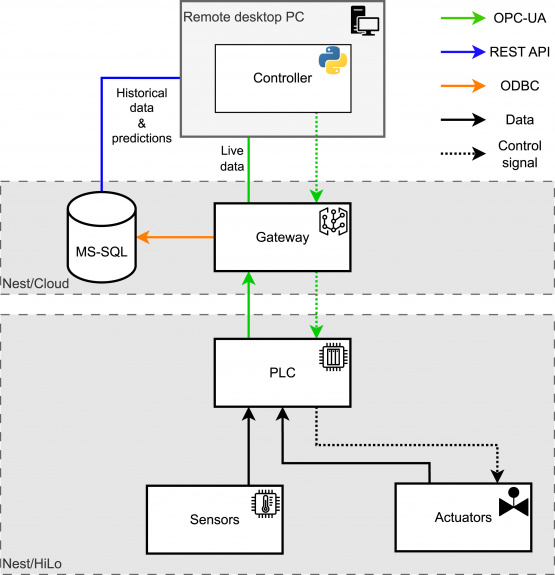Adaptive control strategies to support novel paradigms of predictive energy management and optimisation in smart buildings
This research activity involves Capozzoli Alfonso, Brandi Silvio, , Fop Davide, Razzano Giuseppe
(see our Collaborations page to find out the main collaborations active on these research topics)

| Objective of the activity: Define robust comparison among model-free and model-based control solutions applied to a variety of HVAC system configuration Framework of the activity: The built environment is extremely heterogeneous where every building behaves as a unique entity. In order to identify the optimal control solution for each application in fundamental to develop robust comparisons between different techniques capable to highlight strengths and weakness of the different approaches. This process can support researchers and industry in moving towards the implementation more advanced control strategies for energy management in buildings. BAEDA lab investigates different control approaches including Deep Reinforcement Learning (DRL) and Model Predictive Control. The characterization of the performance of such techniques is performed for different buildings and HVAC configurations and is carried out in dedicated simulation environments leveraging software like EnergyPlus, Modelica and Python.
Figure: Scheme of the different approaches of Deep Reinforcement Learning and Model Predictive Control In the framework of Reinforcement Learning (RL), BAEDA lab develops and analyzes RL control agents considering different architectures of the agents: single-agent and multi-agent. Moreover, different training methodologies are investigaterd: offline training, online training and imitation learning.
Figure: Simplified schematics of the implementation of a Deep Reinforcement Learning controller in the built environment. Relevant publications on this topic:
|

| Objective of the study Provide realistic, high fidelity emulation models to test control strategies, and to obtain building digital twins. Framework of the activity Detailed, high-fidelity building emulators find multiple applications in the field of building control. Control strategies must be tested in simulation in order to assess their performance before the actual in-field implementation. Simulation allows to try out innovative solutions in a safe environment, without any risks or costs related to the actual implementation on real systems, and allowing multiple scenarios to be tested without the timing and practical restrictions of in field testing. Model free controllers can be trained beforehand on the emulator, shortening the training period required on the real building. High-fidelity emulators offer the basis to the implementation of digital twins of the controlled systems, so that simulation can be run in parallel to the operation of the real building. Digital twins allow to test out solutions before the real-world implementation, and they facilitate the benchmarking process, since scenarios alternative to the one actually implemented can be simulated with reliable results. BAEDA lab has gained an extensive expertise in building, calibrating and deploying high-fidelity building emulators, leveraging software tools such as Modelica, TRNSYS, and EnergyPlus. The Functional Mockup Interface standard has allowed us to combine the strengths of each tool into a co-simulation environment which also integrates programming languages such as Python, to obtain a full control loop.
Figure: Co-simulation environment architecture and emulator applications Relevant publications on this topic:
|

| Objective of the activity: Enable the penetration of data-driven models and advanced control strategies in buildings with a limited amount of operational data Framework of the activity: Advanced data-driven control strategies rely on complex models to describe and predict building and systems dynamics. The training process of these models - such as deep neural networks - requires the collection of large amount of historical data that are not usually available for new or refurbished buildings. As a consequence one of the main challenge towards a large-scale implementation of such controllers consists in the high information availability required, which limits their scalability and application. In this context BAEDA lab conducts research activities aimed at implementing and testing transfer-learning frameworks to ease and enable the penetration of data-driven models and advanced control strategies in buildings with a limited amount of operational data.
Figure: Application of transfer-learning frameworks for the control of the built environment Relevant publications on this topic:
|

| Objective of the activity: Implementation of adaptive controllers in real-world testbeds. Framework of the activity: One of the main barriers to the adoption of advanced control strategies in buildings is the lack of real-world testbeds capable to demonstrate to industry operators their effectiveness in achieving cost-effective performance compared to classical control strategies. In this perspective BAEDA lab develops the in-field implementation of adaptive and predictive control strategies in real world environments including both university test facilities and real buildings in collaboration with our research partners. The implemented solution are designed taking care of every aspect of the development process from the conceptualization to the integration into the energy management system software thanks to the latest development in IoT and Cloud technologies.
Figure: The four pillars of real life implementation of advance controls in buildings The activity concerning the real implementation of advanced controller based on DRL algorithm was carried out in collaboration with ETH Zurich, in the framework of the collaboration with the A/S research group led by Prof. Arno Schlueter. An overview of the developed Physical layout for the control system is provided in the following figure.
Figure: Physical layout of the control system implemented in a real office building located in Switzerland Relevant publications on this topic:
|


